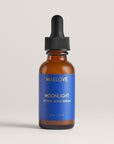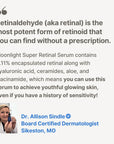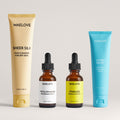




5500+ purchased in the last 30 days
Moonlight Advanced Retinal Night Serum


THE GOLD STANDARD OF OVER-THE-COUNTER RETINOID (0.11% Encapsulated Retinaldehyde aka Retinal)
- It converts to retinoic acid 11x faster than standard retinol, helping to visibly firm your skin, smooth texture, and clear congestion.
SKIN COMFORTING COMPLEX (Niacinamide, Bisabolol, Aloe)
- This blend acts as a peacemaker for your skin.
- It actively soothes redness and allows you to get prescription-level benefits without the typical peeling or irritation.
MOISTURE SHIELD SYSTEM (Ceramides, Squalane, Hyaluronic Acid)
- Reinforces your skin's moisture barrier while you sleep.
- This combination prevents the dryness often associated with retinoid products, ensuring you wake up to skin that feels nourished, not stripped.
BOTANICAL ANTIOXIDANTS (Green Tea, Cloudberry, Cranberry, Magnolia, Honeysuckle)
- Soothe the skin and provide antioxidant support for a brighter, more even complexion.
full ingredient list in FAQ
Apply in the evening to clean, dry skin.
- Apply a thin layer of the Moonlight serum onto your face, neck, and chest.
- Gently massage the product into your skin until it is fully absorbed.
- If you notice any leftover yellowing on your skin after application, it means you have used too much. Simply reduce the amount of product for your next application.
Start by using Moonlight 2–3 nights a week until your skin fully adjusts. Once comfortable, you can gradually increase to daily use.
Retinoids are not recommended during pregnancy or while nursing. Instead, we suggest using our Peptide Squad Collagen Renewal Serum.




Customer Reviews


For the Curious
Moonlight Retinal accelerates skin cell turnover, visibly smoothing fine lines, improving texture, and clearing congestion. It delivers prescription-level power without the typical redness, flaking, or irritation.
Aloe Barbadensis Leaf Juice, Aqua (Water), Niacinamide, Cyclodextrin, Glycerin, Caprylic/Capric Triglyceride, Gluconolactone, Squalane, Bisabolol (L-alpha), Ceramide-NP, Michelia Alba (Magnolia) Flower Oil, Hamamelis Virginiana (Witch Hazel) Water, Camellia Oleifera (Green Tea) Leaf Extract, Rubus Chamaemorus (Cloud Berry) Seed Oil, Sodium Hyaluronate, Tocopheryl Acetate (D-alpha), Vaccinium Macrocarpon (Cranberry) Fruit Extract, Retinal (Retinaldehyde), Polygonum Cuspidatum Extract, Pentylene Glycol, Maltodextrin, Lonicera Japonica (Honeysuckle) Flower Extract, Lonicera Caprifolium (Honeysuckle) Flower Extract, Xanthan Gum, Sodium Benzoate, Sodium Gluconate, Polysorbate 20, Citrus Grandis (Grapefruit) Peel Oil, Citrus Aurantium Dulcis (Orange) Peel Oil, Citrus Aurantium Bergamia (Bergamot) Fruit Oil, Alcohol, Alcohol Denat
When speaking about anti-aging ingredients, the number one spot is always taken by retinoids such as retinol, retinal, and tretinoin. Retinoids are well-studied Vitamin A related compounds. Retinoids address most of the issues surrounding aging skin. With aging, the skin gets less blood flow (less vascularized), becomes thinner and more lax, and finely lined. Additional photoaging from sun damage results in hyperpigmentation spots, rough patches (actinic keratosis), enlarged pores and deep wrinkles. Topical retinoids have been scientifically shown to help treat every one of these issues because they act on nuclear receptors that regular the activation of many genes in a wide variety of cell types (Mukherjee et al. 2006).
First, retinoids increase blood flow to the skin by increasing endothelial cell proliferation leading to increased vascularity. Second, it thickens the epidermal layer of skin by upregulating the proliferation of skin cells (keratinocytes). Third, it reduces fine lines and wrinkles by upregulating collagen production and other components of the extracellular matrix (ECM) including elastin, fibronectin and glycosaminoglycans (GAGs). It does so by increasing dermal fibroblast activity and decreasing collagenase production. Fourth, retinoids can improve hyperpigmentation and the appearance of pore size by inhibiting melanosome transfer to keratinocytes from melanocytes, and accelerating cell turnover. These patterns of results have been replicated in study after study in aged skin and photoaged skin (Saurat et al. 1994, Kafi et al. 2007, Kong et al. 2015, Shao et al. 2017, Bouloc et al. 2014, Creidi et al. 1998, Leydon et al. 2017, Zasada and Budzisz 2019).
Retinoids are used to treat acne as they normalize abnormal desquamation within the sebaceous follicles and decrease the activity of enzymes involved in sebum production. In fact, when retinoids were first approved by the FDA, they were approved for the treatment of acne in 1971 and it wasn’t until 1995 that the FDA approved usage for sun-damaged, prematurely aged skin. Retinal is unique amongst the retinoids in that it also has additional anti-bacterial activity against P. acnes (Pechere et al. 1999). Other retinoids used for acne treatment today often by prescription only include tretinoin (retinoic acid or Retin-A), isotretinoin (Accutane), adapalene (Differin), and Tazarotene (Tazorac) (Mukherjee et al. 2006).
Unlike ingredients that work like hydroquinone (such as arbutin, kojic acid, and licorice root extract in Fade Away serum), retinoids do not target the tyrosinase enzyme which makes melanin (skin pigment). Ingredients like hydroquinone are often called ‘lightening agents.’ In contrast, retinoids even out skin tone by inhibiting melanosome (think sacs that contain melanin) transfer to keratinocytes (skin cells) from melanocytes (cells that make melanin). They also help accelerate the rate at which your skin cells renew allowing dark spots to fade faster (Leydon et al. 2017, Zasada and Budzisz 2019).
Ideally when treating hyperpigmentation, retinoids should be included in combination with other agents. It has been scientifically shown that retinoids in combination with ‘lightening agents’ such as hydroquinone or arbutin, retinoids in combination with Vitamin C, and retinoids in combination with glycolic acid works better than any of these agents used alone (Mukherjee et al. 2006).
In our opinion, retinal is the best retinoid because it combines high potency with the least irritation. Over-the-counter retinal is almost as potent as prescription only tretinoin (i.e. Retin-A), and 10 times more potent than retinol but is less irritating than both at comparable concentrations.
Tretinoin (retinoic acid) is considered the most potent anti-aging retinoid as retinoic acid directly binds to retinoic acid receptors in the nucleus of cells. In other words, no enzymatic conversions are necessary for tretinoin to have its effects. In contrast, retinal relies on an enzyme inside the skin cell to convert it into retinoic acid and retinol relies on an additional enzyme to convert it into retinal which then is converted into retinoic acid. The conversion of retinol to retinal is slow and inefficient, making retinol is 10 to 20 times less potent than retinoic acid. In contrast, the conversion of retinal into retinoic acid is fast and efficient giving retinal almost the same level of potency as tretinoin (Saurat et al. 1994, Sorg et al. 2006, Belyaeva et al. 2020).
Retinoids are irritating for many reasons. In the beginning when the skin is becoming acclimated to retinoids, skin scaling (peeling/flaking) and the resulting loss of skin barrier function (which leads to dry and irritated skin) can occur due to the sudden increase in skin cell turnover. As the skin renew and re-normalized (which can take a few weeks to a few months), this particular source of irritation dissipates. There is also irritation unique to tretinoin that includes reddening due to the presence of a carboxylic acid group which causes skin irritation. There are also burning sensations due to TRP receptor activation for which retinol is the worst culprit followed by tretinoin (Luo et al. 2013, Fluhr et al. 1999, Mukherjee et al. 2006).
Retinal can be more irritating than a much weaker formulation of retinol due to its higher potency and associated peeling/flaking and dryness in the initial few weeks to months. After this period however, retinal is the least irritating retinoid. For those who still find the high potency too difficult to tolerate, another option is to get the skin acclimated to a weaker retinol product (such as Stargaze) before jumping to the higher potency Moonlight.
Retinaldehyde is naturally bright yellow in color. Since Moonlight is formulated with a high concentration of encapsulated retinaldehyde (0.11%), the serum has a natural bright yellow color. At Maelove, we never use dyes or fragrances. The color comes from the natural ingredients.
Retinoids are susceptible to degradation by exposure to light and air. For this reason, retinal may be coated with small particles that prevent it from being exposed to factors that would lead to its breakdown. This coating is what is to referred to as encapsulation. Encapsulated retinal has been shown to retain its stability much longer than retinal without encapsulation. Moonlight has shelf stability of 2 years. Please make sure the bottle cap is tightly closed. Once open, we recommend using up the serum within 3-6 months.
High potency retinoids start working right away at the cellular level. Even after seven days, there are significant changes underneath the skin that can be visualized with special equipment. However, in order for there to be a noticeable difference in the appearance of wrinkles and overall skin texture, it typically takes four to six weeks. To learn more, consult our newsletter.
High potency retinoids can be particularly irritating in the first few months as the skin gets used to the sudden increase in cell turnover. This can result in skin scaling (peeling/flaking) and the resulting loss of skin barrier function (which leads to dry and inflamed skin) (Fluhr et al. 1999).
To mitigate the dryness, we include hydrating ingredients (hyaluronic acid, ceramides, squalane) that can compensate for/ repair some of the broken skin barrier. Niacinamide is also included as a skin barrier supporting ingredient that is also a powerful anti-inflammatory and redness fighting agent. Niacinamide is also anti-aging in its own right. Other anti-inflammatory ingredients include bisabolol, aloe, and other botanicals (Magnolia, Green tea, Cloud berry, Cranberry, Polygonum Cuspidatum, Lonicera Japonica, Lonicera Caprifolium). These coformulated ingredients make Moonlight even easier to tolerate for those with sensitive skin.
Yes, you can use Moonlight with Glow Maker – all Maelove serums are designed so that they can be used together. While AM use is preferred for Glow Maker vitamin C serum, it can also be used in the PM if using twice daily. Apply Glow Maker first and then Moonlight. (If using another brand’s vitamin C serum, reach out to them to make sure it is compatible with a retinoid serum.) If you would like to learn more, consult our newsletter.
No. Topical Retinoids are deemed unsafe to use while pregnant due to risk of birth defects from systemic absorption, i.e. your bloodstream. Maelove offers other powerful anti-aging serums that are safe for use during pregnancy and lactation and these include Night Renewer, Glow Maker, NIA 10 or Peptide Squad serum. If you want to learn more, please check out the following newsletter.
Bouloc A, Vergnanini AL, Issa MC (2014). “A double-blind randomized study comparison the association of Retinol and LR2412 with tretinoin 0.025% in photoaged skin.” J Cosmetic Dermatol, 14, 40-46.
Creidi P, Vienne MP, Ochonisky S, Lauze C, Turlier V, Lagarde JM, Dupuy P (1998). “Profilometric evaluation of photodamage after topical retinalydehyde and retinoic acid treatment.” J Am Acad Dermatol 39: 960-965.
Kafi R, Kwak HSR, Schumacher WE, Cho S, Hanft VN, Hamilton TA, King AL, Neal JD, Varani J, Fisher GJ, Voorhees JJ, Kang S (2007). “Improvement of Naturally Aged Skin with Vitamin A (Retinol)” Arch Dermatol 143: 606-612.
Kong R, Cui Y, Fisher GJ, Wang X, Chen Y, Schneider LM, Majmudar G (2015). “A comparative study of the effects of retinol and retinoic acid on histological, molecular, and clinical properties of human skin.” J Cosmetic Dermatol 15: 49-57.
Leydon J, Stein-Gold L, Weiss J (2017). “Why topical retinoids are mainstay of therapy for acne.” Dermatol Ther (Heidelb) 7: 293-304.
Mukherjee S, Date A, Patravale V, Korting HC, Roeder A, Weindl G (2006). “Retinoids in the treatment of skin aging: an overview of clinical efficacy and safety.” Clinical Interventions in Aging. 1(4) 327-348.
Saurat JH, Didierjean L, Masgrau E, Piletta PA, Jaconi S, Chatellard-Gruaz D, Gumowski D, Masouye I, Salomon D, Siegenthaler G (1994). “Topical Retinaldehyde on Human Skin: Biologic Effects and Tolerance.” J Invest Dermatol 103:770-774.
Shao Y, He T, Fisher GJ, Voorhees JJ, Quan T (2017). “Molecular basis of retinol anti-aging properties in naturally aged human skin in vivo.” Int J Cosmet Sci. 39(1): 56-65.
Zasada M and Budzisz E (2019). “Retinoids: active molecules influencing skin structure formation in cosmetic and dermatological treatments.” Adv Dermatol Allergol XXXVI(4): 392-397.
Mukherjee S, Date A, Patravale V, Korting HC, Roeder A, Weindl G (2006). “Retinoids in the treatment of skin aging: an overview of clinical efficacy and safety.” Clinical Interventions in Aging. 1(4) 327-348.
Pechere M, Pechere JC, Siegenthaler G, Germanier L, Saurat JH (1999). “Antibacterial activity of retinaldehyde against Propionibacterium acnes.” Dermatology. 199(suppl1): 29-31.
Leydon J, Stein-Gold L, Weiss J (2017). “Why topical retinoids are mainstay of therapy for acne.” Dermatol Ther (Heidelb) 7: 293-304.
Mukherjee S, Date A, Patravale V, Korting HC, Roeder A, Weindl G (2006). “Retinoids in the treatment of skin aging: an overview of clinical efficacy and safety.” Clinical Interventions in Aging. 1(4) 327-348.
Zasada M and Budzisz E (2019). “Retinoids: active molecules influencing skin structure formation in cosmetic and dermatological treatments.” Adv Dermatol Allergol XXXVI(4): 392-397.
Belyaeva OV, Adams MK, Popov KM, Kedishvili NY (2020). “Generation of Retinaldehyde for Retinoic Acid Biosynthesis.” Biomolecules. 10(5). doi:10.3390/biom10010005.
Fluhr JW, Vienne MP, Lauze C, Dupuy P, Gehring W, Gloor M (1999). “Tolerance Profile of Retinol, Retinaldehyde and Retinoic Acid under Maximized and Long-term Clinical Conditions.” Dermatology 199(suppl1): 57-60
Luo J, Clark R, Yang Q, Du G, Zhou S, Yu W, Qian A, Walters E, Carlton S, Hu H (2013).
“Retinoids activate the irritant receptor TRPV1 and produce sensory hypersensitivity.” The Journal of clinical investigation DOI:10.1172/JCI66413
Mukherjee S, Date A, Patravale V, Korting HC, Roeder A, Weindl G (2006). “Retinoids in the treatment of skin aging: an overview of clinical efficacy and safety.” Clinical Interventions in Aging. 1(4) 327-348.
Saurat JH, Didierjean L, Masgrau E, Piletta PA, Jaconi S, Chatellard-Gruaz D, Gumowski D, Masouye I, Salomon D, Siegenthaler G (1994).
“Topical Retinaldehyde on Human Skin: Biologic Effects and Tolerance.” J Invest Dermatol 103:770-774.
Sorg O, Antille C, Kaya G, Saurat JH (2006). “Retinoids in cosmeceuticals” Dermatologic Therapy 19, 289-296.
Fluhr JW, Vienne MP, Lauze C, Dupuy P, Gehring W, Gloor M (1999). “Tolerance Profile of Retinol, Retinaldehyde and Retinoic Acid under Maximized and Long-term Clinical Conditions.” Dermatology 199(suppl1): 57-60

Today, we're going to show you many pictures and images, so that you can see (and not just read about) the fascinating molecular and cellular transformations that occur when you...



